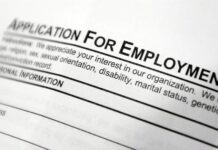Big retail has announced its displeasure with President Donald Trump’s America First policy of reciprocal tariffs.
On Wednesday, on what Trump has dubbed “liberation day,” he announced a sweeping reciprocal tariff policy, hoping to right the wrongs of decades of unfair trade policies with countries across the world.
Many would think that corporate America, hoping to better the nation’s workers, would embrace the trade policies that would put American on a more even footing with its trading partners given that corporate America had embraced his America First agenda in January.
Walmart CEO Doug McMillion met with Trump in January ahead of his inauguration, with a Walmart spokesperson saying, “We stand ready to help move our country forward.” Many of America’s business leaders congratulated Trump on his historic election last November, attended his inauguration, and met with the president before his term in office started.
In March, Trump even met with these CEOs at the Business Roundtable, a nonpartisan D.C.-based economic advocacy group comprising more than 200 CEOs.
Despite what seemed like the apparent embrace between corporate America and Trump, it has become clear that the National Retail Federation (NRF) no longer backs his policies.
Upon announcing his reciprocal tariff policy, the NRF released a statement from its executive vice president of government relations, contending that more tariffs lead to higher costs for American families.
“Tariffs are a tax paid by the U.S. importer that will be passed along to the end consumer. Tariffs will not be paid by foreign countries or suppliers,” David French, its government affairs lead, said in a written statement.
Despite this frequent claim from anti-tariff advocates, economists at the Federal Reserve and the National Bureau of Economic Research (NBER) found minimal pass-through into broad inflation.
Breitbart News Economics Editor John Carney has frequently dispelled the notion that companies can simply place the price of tariffs onto consumers:
The notion that consumers ultimately foot the bill for these tariffs hinges on the flawed belief that businesses can seamlessly pass on increased costs. This assumes, improbably, that businesses are charging less than what consumers are willing and able to pay. If that were the case, businesses would be leaving potential profits unclaimed—a scenario at odds with market realities.
In practice, businesses typically charge the maximum price the market can bear, balancing consumer demand, supply, and competition. Imposing a tariff on imports doesn’t suddenly grant businesses more latitude to hike prices.
“Big Retail is America First in name only. After pretending to be all-in on President Trump’s agenda, now when it truly matters, the corporate overloads at American companies like Wal-Mart are reversing course. If 2024 taught us anything, it’s that the MAGA base is growing and corporate America can no longer ignore them. As these companies dig in against Trump, MAGA voters may very well choose to abandon them,” a Republican operative told Breitbart News.
Sean Moran is a policy reporter for Breitbart News. Follow him on X @SeanMoran3.




